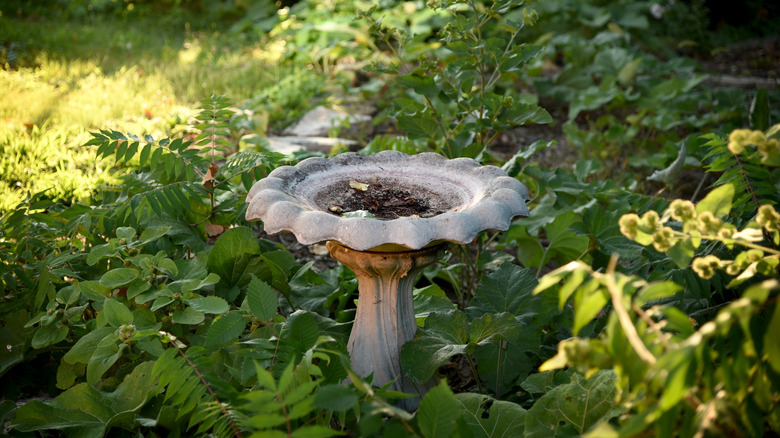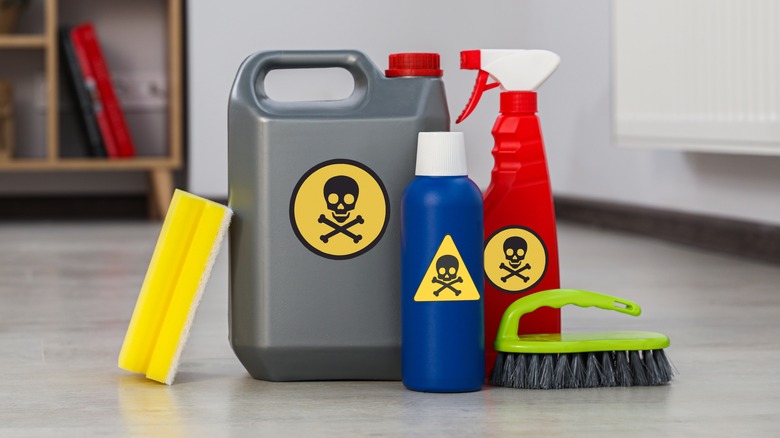Cleaning Ingredients You Should Avoid Using On Your Bird Bath
You went away on vacation only to come back to a birdbath filled with algae. Naturally, you reach for the bleach. After all, it's better to ditch store-bought cleaners and use this handy essential to keep your birdbath fresh, right? Wrong! Whatever you use to clean your bird bath might hang about on the surface, no matter how liberally you rinse the bowl out after washing. Wild birds preen their delicate feathers and might come into contact with nasty or even seemingly innocuous — at least to us humans — cleaning products. Many experts say you should avoid chemical cleaners and essential oils and stick with water, vinegar, or, in a pinch, hydrogen peroxide or baking soda instead.
Algae feed on fallen leaves, feathers, bird poop, and other contaminants in the water. Some birds, like grackles, even wash their food in the baths! Unclean birdbaths also risk spreading bird and even human diseases. Research from the University of Tennessee into the role bird baths play in transmitting the tiny yet often deadly parasite Trichomonas gallinae found that they can't be ruled out as a source for outbreaks. Visitors, who might come from anywhere, especially during the migratory season, could introduce and spread infectious diseases like house finch eye disease, salmonella, avian pox, and avian flu. Depending on where you live, the still, tepid waters of your birdbath could even pose a health risk to you and your family by harboring mosquito-borne illnesses like Zika and, perhaps even worse, West Nile Virus.
What's the problem with these ingredients
Avoid using chemical cleaning products, including soaps and household cleaners. They're problematic for our feathered friends at best and downright dangerous at worst. Birds' feathers are covered in protective natural oils that repel water, helping to keep them dry and warm. If birds bathe in water containing synthetic cleansers (even just the residue in a bath that was poorly rinsed after cleaning), this oil gets stripped away, leaving the birds vulnerable to adverse weather conditions.
Likewise, recommendations to add essential oils like lavender or rosemary to birdbath water are wrong. You risk the same outcome of feathers stripped of waterproofing. If you spy algae bloom in your birdbath, you might be tempted to use algaecide or chemical pool cleaners. After all, they're designed to eliminate the green gunk in water. Don't do it! While these cleaners might be safe for humans, they're potentially toxic to birds.
Bleach might not be the genius trick that will keep your birdbath clean. Some experts recommend it, yes — so long as you follow some specific advice. Cover the birdbath while soaking it in a heavily diluted bleach-water solution (1.5 ounces of bleach to a gallon of water) and give it a very good rinse with fresh water after cleaning. However, other bird gurus say that, as a chemical cleaner, it's potentially harmful. For the safety of your backyard visitors, it's probably best to err on the side of caution and default to a safer cleaning option instead.
Cleaning agents that are safe for birds
You could try putting a few pennies in your birdbath, which only protects against algae. That nasty bathing bowl needs a deeper clean. An Australian study of birdbath owners published in the Journal of Urban Ecology found that over half of the respondents said they clean their birdbaths regularly. What's "regularly"? Most advice says once a week. The easiest way to clean your bird bath is to use near-boiling water and a good-quality scrubbing brush for concrete or natural stone or cloth or sponge for glass, metal, and glazed ceramic. Wear gloves to protect your hands from the hot water.
If the water isn't cutting it, try vinegar, hydrogen peroxide, or baking soda. For vinegar, use a 1:9 ratio of vinegar to water. Hydrogen peroxide requires a 1:1 dilution with water. Make a paste using baking soda and water and apply it to stubborn stains only, or liberally sprinkle the powder into the bath bowl and scrub. Some commercially produced birdbath cleaners on the market are purportedly safe for birdbaths and the birds that bathe in them. Most use natural enzymes (similar to vinegar) as the cleaning agent. For example, Nature Niche sells a Birdbath Statuary Cleaner by Care Free Enzymes in a 12-ounce spray bottle for $12.50. Whichever household ingredient you choose, rinse the bath thoroughly with fresh, clean water after you scrub — at least twice is best. You don't want any residue left in the bowl.

